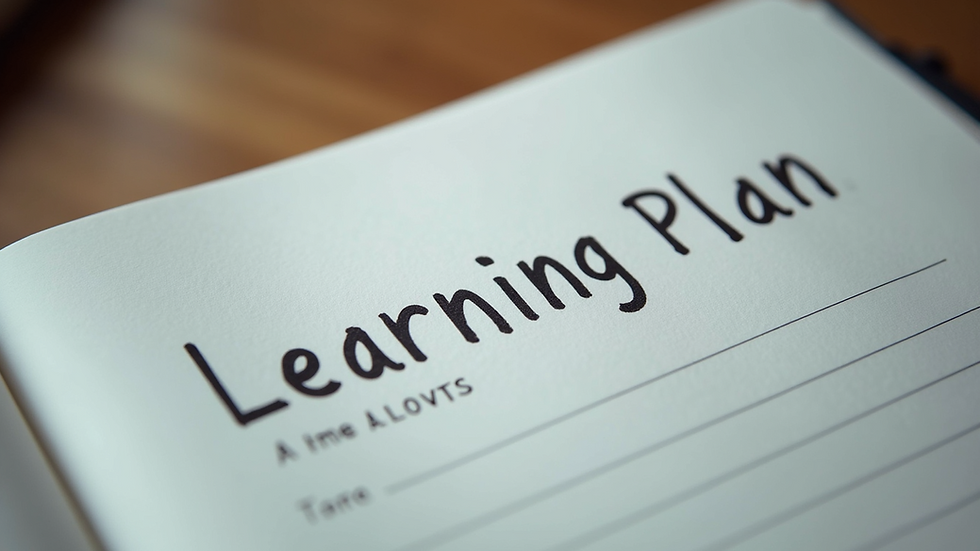Personalize Education with Custom Learning Plans
- Stephanie
- Oct 7
- 3 min read
Education is not one-size-fits-all. Each learner has unique strengths, challenges, and goals. That’s why custom learning plans are transforming how we approach education. By tailoring instruction to individual needs, these plans help students thrive academically and personally. I want to share how you can harness the power of custom learning plans to make education more effective and engaging.
Why Custom Learning Plans Matter
Traditional education often follows a fixed curriculum and pace. This can leave some students behind or bored. Custom learning plans break this mold by adapting to each learner’s style, interests, and pace. When education fits the student, motivation and understanding improve dramatically.
For example, imagine a student who excels in math but struggles with reading. A custom learning plan can allocate more time and resources to reading while allowing the student to advance faster in math. This balance prevents frustration and boredom, making learning more enjoyable.
Custom learning plans also support diverse learning environments. Whether in a classroom, homeschooling, or online education, these plans provide structure and flexibility. They empower educators and parents to focus on what truly matters for each learner.

How to Create Effective Custom Learning Plans
Creating a custom learning plan involves several key steps. Here’s a practical approach you can follow:
Assess Strengths and Needs
Start by identifying the learner’s current skills, interests, and challenges. Use assessments, observations, and conversations to gather this information.
Set Clear Goals
Define specific, measurable, achievable, relevant, and time-bound (SMART) goals. For example, improving reading comprehension by one grade level in six months.
Choose Appropriate Resources
Select textbooks, online tools, activities, and support services that align with the learner’s goals and preferences.
Design a Flexible Schedule
Plan lessons and activities with enough flexibility to adjust as progress is made or challenges arise.
Monitor Progress and Adjust
Regularly review the learner’s progress and make necessary changes to the plan. This keeps the learning experience dynamic and responsive.
By following these steps, you create a roadmap that guides learning while respecting individual differences.
What are personalized learning plans?
Personalized learning plans are detailed educational roadmaps tailored to an individual’s unique needs and goals. Unlike generic curricula, these plans focus on the learner’s strengths, weaknesses, interests, and pace. They often include customized content, teaching methods, and assessment strategies.
For instance, a personalized learning plan might incorporate visual aids for a student who learns best through images or provide hands-on experiments for a kinesthetic learner. The goal is to make learning more relevant and effective.
These plans also encourage active participation from learners, helping them take ownership of their education. When students feel involved in shaping their learning journey, their engagement and confidence grow.

Benefits of Using Custom Learning Plans
The advantages of custom learning plans extend beyond academic improvement. Here are some key benefits:
Increased Engagement
Tailored content keeps learners interested and motivated.
Better Retention
Learning at one’s own pace helps solidify understanding.
Improved Confidence
Success in achievable goals builds self-esteem.
Support for Diverse Learners
Plans can accommodate different learning styles, disabilities, and cultural backgrounds.
Parental and Educator Involvement
Custom plans foster collaboration between students, parents, and teachers.
For example, a student with dyslexia might use specialized reading software as part of their plan, while a gifted student could explore advanced topics beyond the standard curriculum. Both benefit from a learning experience that respects their individuality.
How to Implement Custom Learning Plans in Educational Settings
Implementing custom learning plans requires commitment and collaboration. Here’s how schools, parents, and tutors can work together:
Start Small
Begin with one or two students to pilot the approach and learn from the experience.
Train Educators
Provide professional development on creating and managing custom learning plans.
Use Technology
Leverage educational software and platforms that support personalized learning.
Communicate Regularly
Keep open lines of communication among students, parents, and educators to share progress and challenges.
Celebrate Successes
Recognize milestones to encourage continued effort.
By integrating these practices, educational institutions can create a supportive environment where custom learning plans thrive.

Taking the Next Step with Personalized Learning Plans
If you’re ready to explore how personalized learning plans can transform education, consider partnering with experts who specialize in this approach. The Scholarly Edge offers tailored strategies and support to help students, parents, and institutions achieve academic success.
By embracing custom learning plans, you open the door to a more meaningful and effective educational experience. Remember, education is a journey - make it one that fits you perfectly.
For more information on how to get started, visit personalized learning plans. Your path to academic success begins with a plan designed just for you.





Comments